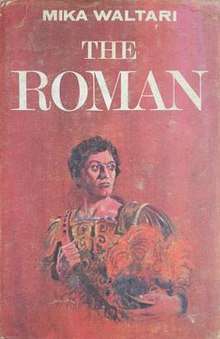The Roman
The Roman (original title Ihmiskunnan viholliset, which translates to Mankind's Enemies) is a fiction novel by Mika Waltari published in 1964, and was the last work of Waltari to be published during his lifetime. Set in Rome, the book is a sequel to The Secret of the Kingdom, a novel about the early days of Christianity. The protagonist and narrator is Minutus, the son of Marcus, the main character of the previous novel. Minutus is a Roman citizen striving to survive without political entanglements.
 First UK edition (publ. Hodder & Stoughton, 1966) | |
| Author | Mika Waltari |
|---|---|
| Original title | Ihmiskunnan viholliset |
| Country | Finland |
| Genre | Historical novel |
| Publisher | WSOY |
Publication date | 1964 |
In the novel, Minutus travels from Corinth to Britain, to Rome and then to Jerusalem. Through a boyhood friendship with Nero, he becomes a sometimes advisor, sometimes a tool, and sometimes a fool of the capricious emperor. A cruel fate makes him the commander of the menagerie that supplied the wild animals that tore his father and son to pieces, and the book was ostensibly written as a guide for his son, great-grandson of the Emperor Claudius.
Plagiarism of the novel
In July 2008, news emerged that the novel had been plagiarized by television producer Colin Slater (Rapsittie Street Kids: Believe In Santa) in his novel Lindum Colonia, published in 2003.[1]
References
- "''Waltari-roman plagierades i USA'' (24.7.2008)" (in Swedish). Svenska.yle.fi. 2008-07-24. Retrieved 2012-08-04.